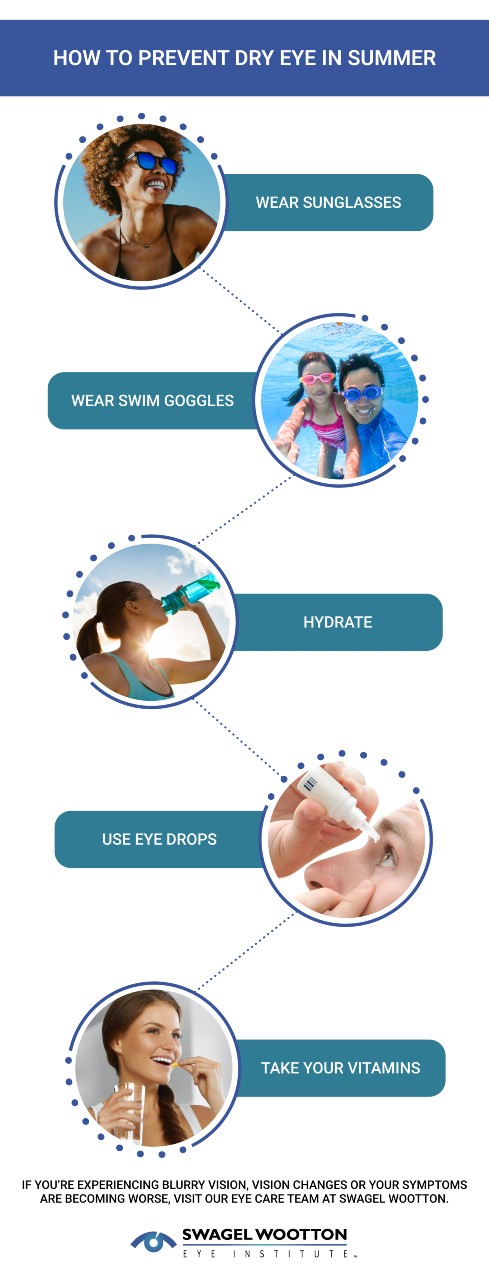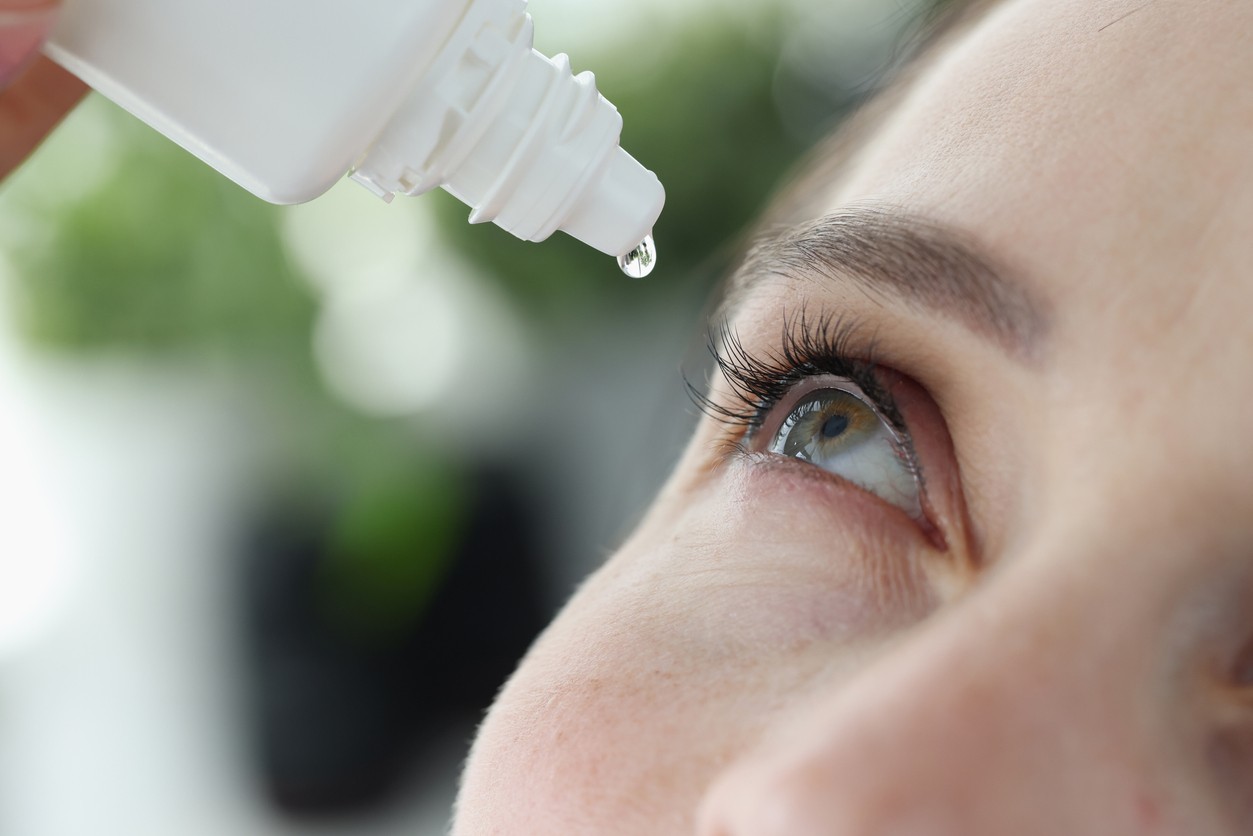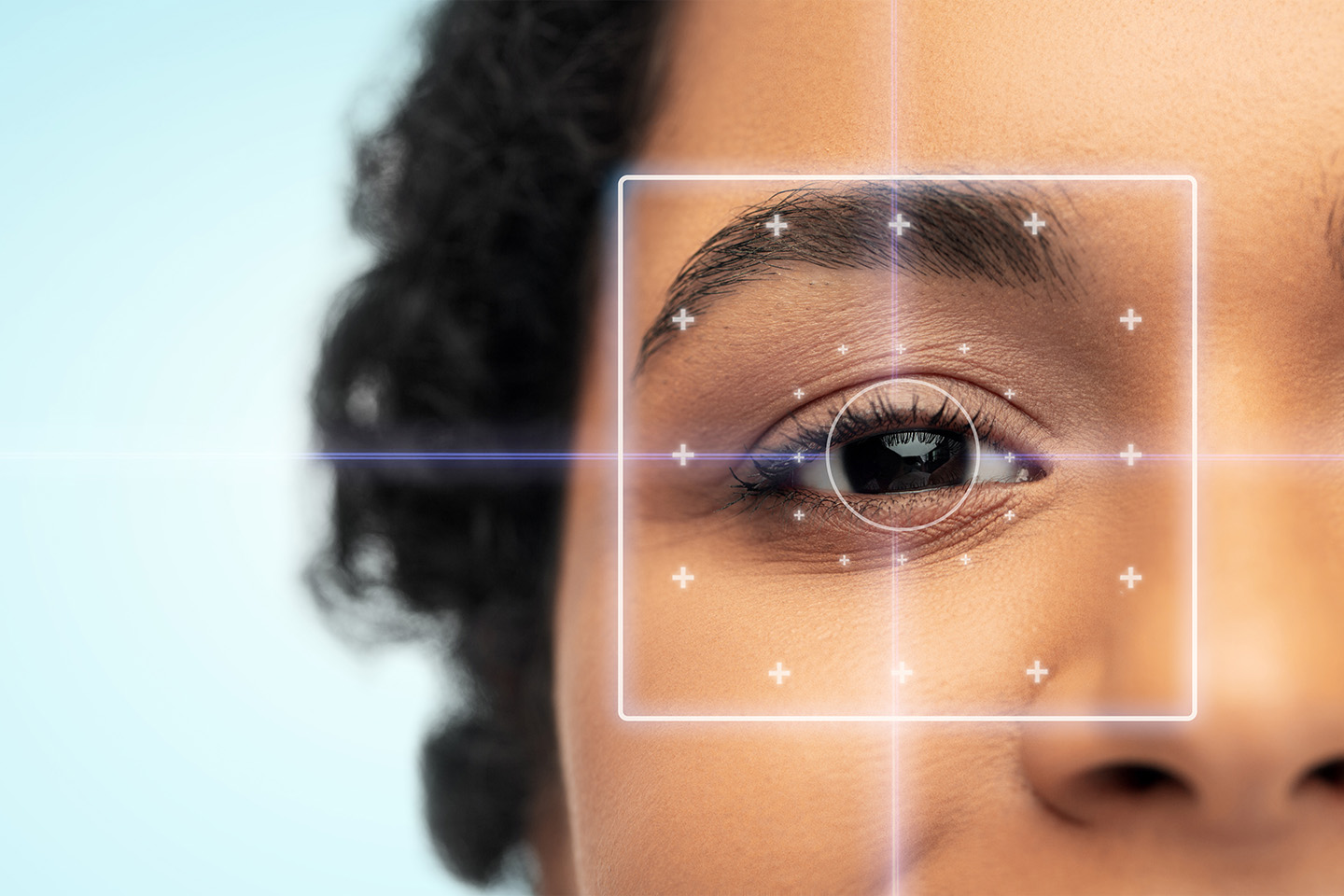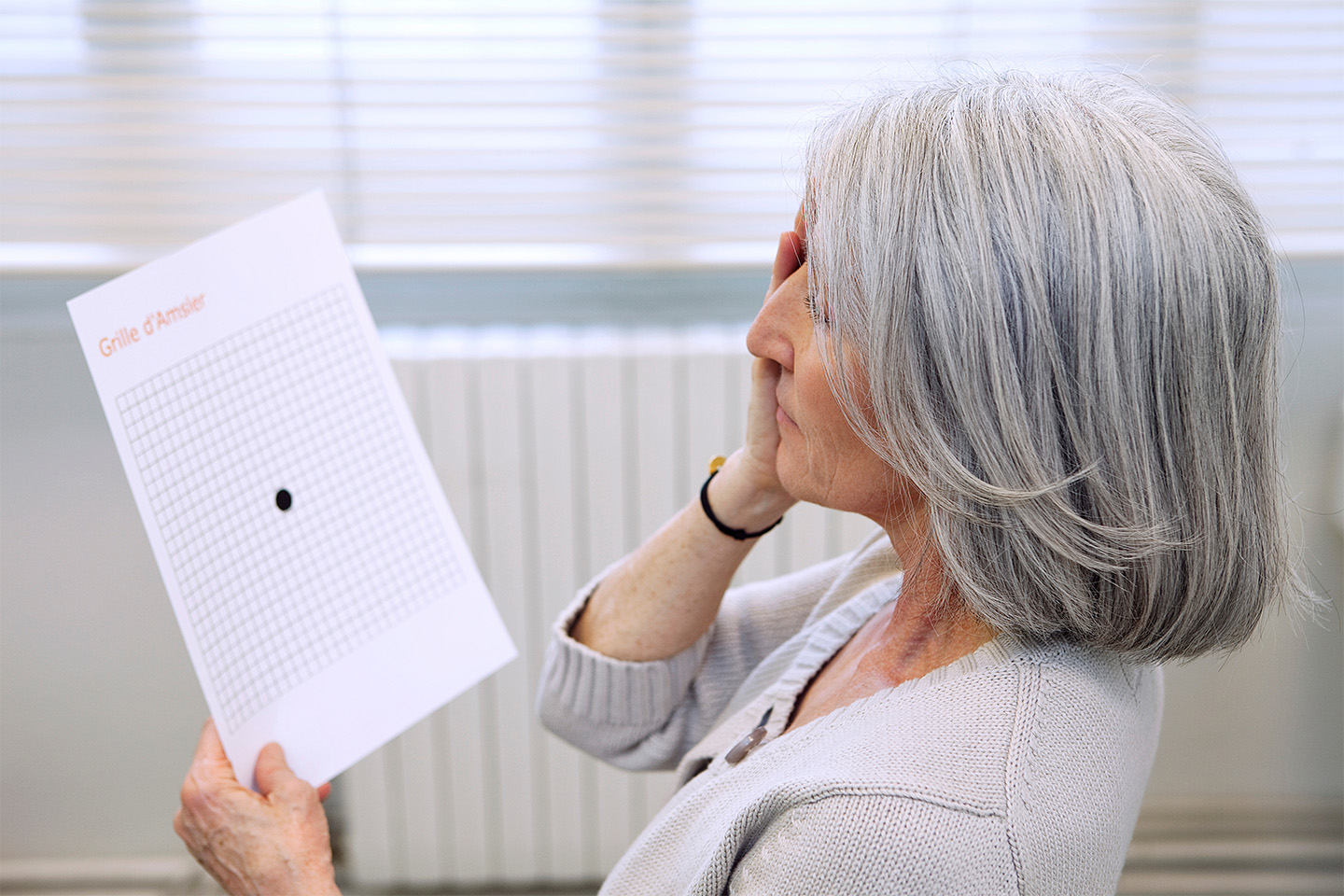How to Treat Dry Eye During Summer

Arizonans are not strangers to hot, dry weather. Although some love the summer months, it often leaves others struggling with their eye health. At Swagel Wootton Eye Institute, we know that many of our patients begin suffering from dry eye as the weather becomes warmer. Dry eye symptoms can range from slightly uncomfortable to unbearable. In either case, they can impact your quality of life, interrupt enjoyable activities, and prevent you from going outside at all. Read more to find out why dry eye often becomes worse in the summer and how to prevent and treat dry eye
Why Is Dry Eye Worse During Summer Months?

Dry eye is a condition where your eyes do not have or do not produce enough moisture. Dry eye symptoms include grittiness or the feeling of sand in your eyes, soreness, a burning sensation, or fatigue. Often, these symptoms worsen with seasonal changes. It is extremely important to understand why you may experience dry eyes more often in the summer. Prevention and treatment may depend upon the specific reason. So, keep reading to learn more about the common causes of summer dry eye below.
Allergies or Dry Eye Syndrome?
In Chandler and Mesa, AZ, allergy season begins in the early spring and continues till early summer. If symptoms begin in late February and become progressively worse as grass grows or flowers bloom, you may be dealing with seasonal allergies On top of the symptoms associated with dry eye, you may also experience itchy eyes, watery eyes, redness and even blocked tear ducts. If you wear contact lenses, you may find yourself rubbing them constantly.
If you experience symptoms all year round, you may struggle with other types of allergies. For instance, you may have allergies to something in your home or work environment. This can range from pet dander to mold spores.
The only way to tell for sure if you are suffering from allergies or dry eye syndrome is to book an appointment with an eye care professional. At Swagel Wootton, our caring team will evaluate your eyes and verify whether you have dry eye syndrome or allergies.
Lack of Humidity
In Arizona, the desert climate brings consistently high temperatures, sometimes reaching 110 degrees, and constant sunshine can impact the humidity levels outside. Likewise, air conditioning can dehumidify your indoor air. The constant dry environment causes any moisture to evaporate from your eye at a faster rate. As a result, you may develop chronic dry eyes. You may also find this occurs in the winter months due to indoor heating.
Sunlight
If you spend a great amount of time doing outdoor activities, direct sunlight exposure may be the cause of your dry eyes. Similar to warm weather and dry climates, the sun can evaporate moisture from your eye very quickly. The harmful UV rays also pose other serious eye health risks such as Photokeratitis (corneal burns).
Swimming Pools
Hot summers call for days by the swimming pool and evenings in a hot tub. Although these amenities are certainly enjoyable, chlorine can strip your eye’s tear film. There are three layers in the tear film: an outer oily layer, a middle watery layer, and an inner mucus layer. This tear film is incredibly beneficial for a number of reasons, including maintaining the moisture on the eye’s surface, preventing damage from dryness, and preventing bacteria from entering the eye. Since chlorine is such a powerful chemical, it can remove the film and irritate your eye. Although saltwater from the ocean or saltwater pools can irritate your eye, it is not likely to remove the film.
Smoke and Dust
There are plenty of activities marked as summer favorites, including firing up the grill or going on desert hikes. Yet, smoke, dust, and sand can dry out and damage your eyes. First, they create dry air around your eye and second, tiny smoke and dust particles can get stuck in your natural tear film. If your eye cannot produce enough tears to remove the particles, it will remain dry and irritated. These particles can also cause abrasions, or bacteria making its way past your tear film. In this way, it can lead to a bacterial infection.
Dehydration
Dehydration is another common cause of dry eye in summer. Even if you drink the same amount of water as you always do, the hot weather can lead to dehydration, especially if you are doing activities. Dehydration causes less tear production. Accordingly, your eyes suffer a lack of lubrication, leading to dry eyes and eye strain.
How to Prevent Dry Eye

At Swagel Wootton, we know you do not want to spend the entire, beautiful Arizona summer cooped up inside your home. Fortunately, there are ways to prevent dry eyes from taking over your life. Consider the following prevention strategies.
1. Wear Proper Eye Protection
Proper eye protection can prevent many of the causes of summer-related dry eye syndrome. If you wear sunglasses, you can protect your eyes from the sun, smoke, dust, and debris. For proper UV protection, opt for UV400 ratings or 100 percent UV protection If you wear contact lenses, ask our eye doctors about lenses with UV absorption.
Additionally, eye protection is beneficial within a chlorine or chemically treated pool. Always wear well-fitting goggles if you plan on taking a dip below the surface.
2. Eat a Healthy, Balanced Diet
A healthy diet rich in Omega-3 fatty acids, Vitamin A, and Vitamin D can help prevent dry eyes or reduce dry eye severity. Add leafy green vegetables, orange and yellow fruits and vegetables, fish, or fatty acids supplements into your meals and note any differences. Be sure to consult with your doctor prior to taking any new vitamins or supplements, if you plan to go that route.
3. Hydrate
For your overall health and your eye health, it is beneficial to drink plenty of water. You may need to increase your water intake if you are spending any amount of time in hot weather, performing outdoor activities in the summer, or constantly switching from air-conditioned environments to outdoor air. Moreover, we recommend reducing any dehydrating liquids such as alcoholic, caffeinated, or sugary drinks.
4. Lubricate Your Eyes
If you are not creating enough tears, purchase eye drops from your local drug store. You can use artificial tears as needed to keep your eyes moisture-rich, especially if you spend a great amount of time outdoors or in an air-conditioned office.
5. Visit the Eye Doctor
Are you suffering from chronic dry eye? Are you experiencing eye problems like blurry vision? It’s time to visit your eye care team, Swagel Wootton, for a professional assessment. An eye doctor will confirm if you are struggling with dry eye syndrome, an eye allergy, allergic conjunctivitis (inflammation), or bacterial infection.
How to Treat Dry Eye

If you suffer from dry eye, it is important to seek assistance from our qualified Swagel Wootton eye care doctors. We can evaluate your eye, professionally diagnose your condition, and provide treatment options. As an at-home diagnosis and treatment often lead to worsening symptoms or inaccurate identification, come see our experienced team for a comprehensive eye evaluation and specialized exams.
A few of our most common ways to treat dry eye include the following.
Warm Compress
When dry eyes cause irritated eyes, grittiness, or soreness, one of our first pain-relief measures is a warm compress. Additionally, the moist heat can hydrate the eyes, reduce grittiness, and relax strain or tenseness in or around the eye. An eye doctor must evaluate your eye prior to suggesting a warm compress, as the heat can open the meibomian glands (oil glands along your eyelash lines) and improve oil flow to your tear film. This can slow down any tear evaporation. However, if material or fiber obstructs the meibomian glands, it can lead to further eye problems
Prescription Eye Drops
Prescription eye drops can help lubricate your eyes better than over-the-counter artificial tears. While they can increase tear production or reduce inflammation, they often do not resolve chronic dry eye. Significantly, eye drops help in temporary situations such as those caused by smoke, dust, sand, chlorine pools, or seasonal allergies.
Serum Tears
Serum tears may be an excellent treatment for certain patients suffering from severe or chronic dry eyes. Labs create special, clear eye drops made out of your own blood. Similar to artificial tears, these tears lubricate your eyes. However, composed of your own DNA, they have unique healing and pain-relief properties.
Punctal Plugs
Punctal plugs are small devices implanted in the opening of your tear ducts (puncta) that drain tears. When a doctor implants punctal plugs, your eyes stop draining tears. Correspondingly, the eye should retain more moisture and be more comfortable. Effectively, they relieve chronic dry eyes, itchy eyes, or burning eyes.
Dry Eye Diagnosis and Treatment in Arizona
Find relief from your dry eyes when you visit our Swagel Wootton Eye Institute in Chandler, AZ and Mesa, AZ. We can perform a thorough eye evaluation, provide an accurate diagnosis, and prescribe effective eye treatments. Whether you have chronic dry eye, only develop dry eye in the summer heat, or have other eye concerns, our caring team is here to help. Contact us today to schedule an appointment!









